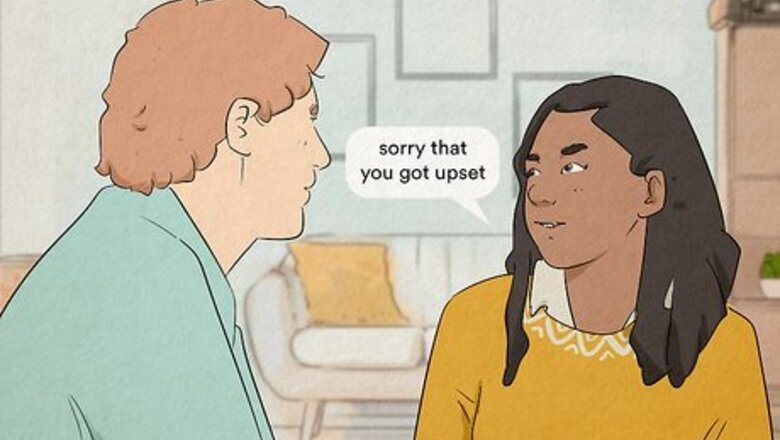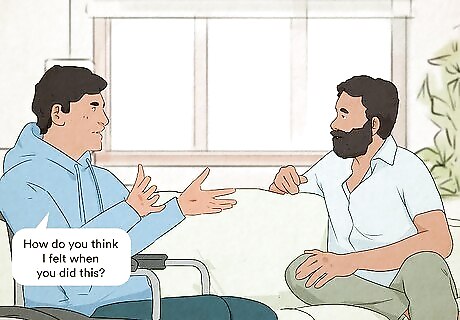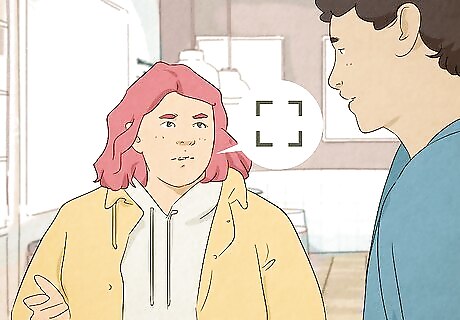
views
X
Trustworthy Source
Cleveland Clinic
Educational website from one of the world's leading hospitals
Go to source
This article is based on an interview with our licensed professional clinical counselor, Jay Reid, LPCC. Check out the full interview here.
Recognize the signs of a bad apology.

Accept an apology only if it’s not purely self-interested. Some people only say they’re sorry to smooth things over and regain control, and they may not believe (or care) if they are responsible for causing harm. Keep a look out for some of these signs of a manipulative or inauthentic apology: Phrases like “I’m sorry that you got upset” or “I’m sorry that you felt bad” that shift the blame to you, rather than to their actions. Empty apologies that simply say “I’m sorry,” without any further substance. An incomplete apology, which goes further than “I’m sorry,” but doesn’t express any regret or give any sign that they plan on changing their behavior in the future. Phrases that deny that the narcissist did anything wrong in the first place, like “It wasn’t my fault.”
Ask them if they can see your perspective.

An apology is sincere if they recognize how you were affected. When responding to this person’s apology, try to see if you can get them to understand the hurt you feel. After they apologize to you, ask them a question like, “How do you think I felt when you did this?” or “Did you think about how your actions would affect me when you did them?” Narcissism makes it hard to empathize with others sometimes, but if you can get this person to see your point of view, you might be able to use this empathy to help rebuild your relationship. If they don’t seem to understand your perspective, communicating with them will likely continue to be a challenge.
Communicate your boundaries clearly.

Let them know what you will and won't tolerate. After they apologize, let them know that if they act in a similar way in the future, there will be consequences, and keep your word. Open up this conversation by saying something like, “It’s time for us to establish boundaries in our relationship.” For example, if you’re dealing with a narcissistic parent, you might say something like, “If our next conversation devolves into a screaming match, and you call me names again, I’m going to have to reduce the frequency of our calls from weekly to monthly.”
Let them know you’re disappointed in them.

If your relationship with this person is important, be gentle but firm. Some people with narcissistic tendencies can be sensitive to criticism. To help ensure they don’t get defensive or angry, express your hurt calmly and respectfully. Tell them something like, “I’m very disappointed in you because of what you did, and am struggling to find a way to trust you.” Respect yourself—don’t lie to preserve their feelings, and make it clear that their actions have harmed your relationship.
Tell them you won’t accept an apology at the moment.

Try not to force yourself to forgive before you’re ready. It’s important to avoid trying to please or appease anyone at the expense of yourself. You are never obligated to accept an apology, even if you’re being guilt-tripped into it. You can instead say something like, “I’m not in a place to forgive you at the moment, but thank you—I needed to hear this apology.” You can also say something like, “While I appreciate the time you took to give me this apology, I’m still pretty hurt, and just not ready to accept it at the moment. We might be able to try and repair our relationship in a few months’ time.”
Keep yourself safe from an outburst.

If this person is prone to lashing out, de-escalate conflicts. If you’re having a difficult conversation and they become aggressive with you, leave the room. Arguing with a manipulative or overly sensitive person can be a challenge, since they’re unlikely to hear you, no matter how reasonable you are. It’s best to just say something like, “I disagree with your assessment of me,” and try to steer the conversation in a more constructive direction. Remember that narcissistic people are often acting out of a place of deep woundedness. This can cause them to harm others, because they themselves are experiencing pain. Have some empathy for this situation, but don’t tolerate any abuse.
Set expectations for your relationship.

Ask yourself what this relationship provides you and what it costs you. It can be helpful to write down your feelings about your relationship so that you can more clearly understand your thinking. This person may be a challenge to deal with, but your relationship may be able to offer you other things, so take stock of them. If you know you can’t expect affirmation and love from them, don’t ask them for this when they apologize—instead, seek these things out elsewhere, and ask this person to work on things that may be more manageable, such as respecting your boundaries. If you realize that your relationship with them is costing you far more than it provides, it’s OK to take a step back from it. This can be especially difficult if they’re in your family, but even limiting your contact can help you feel more secure.
Know there’s a possibility they will seek revenge.

If they’re controlling, they may not react well to being held accountable. If you don’t respond to their apology with total forgiveness, they might try to punish you by distancing themselves, making new demands in your relationship, or otherwise trying to manipulate you. You can’t control their actions, but you can stand firm on being treated the way you deserve to be. Narcissistic people don’t forgive easily if they feel hurt. If this person pushes away from you, let them—if they care about you, they’ll come back.
Accept that you can’t fix them.

Try not to rely on this person to change. Understand that some people are never going to change, so all you can do is manage your own relationship with them, so that you can preserve your dignity and happiness. Whether this person has clinical NPD or just some narcissistic tendencies, it will likely take time and dedication from them to change their ways. If they’re not willing to do the work, they’re unlikely to change.
Find a support system that treats you how you deserve.

Some people isolate you to keep control over you. Therefore, it’s important to cultivate relationships with a variety of different people through work, volunteering, or other social activities. Finding other, more affirming relationships will give you a greater sense of security, and keep you from getting dragged down by this person. If they try to make you believe you’re a far worse version of yourself, don’t fall for it. Buying into their vision of who you are will only keep you from removing their hold over you.
Seek a therapist to recover.

Dealing with a narcissistic relationship can take a serious toll on your mental health. It can also impact the way you interact with others in the future, and the amount of trust you can place in your relationships. Don’t let a single individual dictate your life—talk to a therapist or another mental health professional to strategize plans for recovery and rebuilding confidence in yourself.


















Comments
0 comment